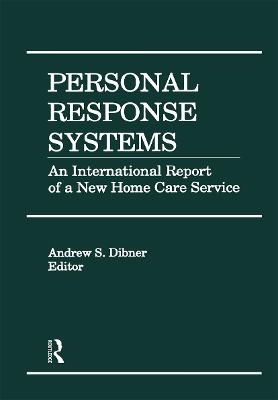
Personal Response Systems
Routledge (Verlag)
978-1-138-97823-2 (ISBN)
the technology of personal response systems
demographic trends
how to set up a PRS in a community
the integration of PRS into housing for the elderly and disabled
benefits to consumers and health care systems
the effects of PRS on family relationships
emergencies best suited for PRS
analysis of how future technology will expand the medical and protective functions of PRSHealth care planners, social workers, physicians, case managers, housing developers and managers, and others involved in caring for the elderly or disabled will find a valuable store of information in this comprehensive volume. They will be able to evaluate more quickly the most appropriate PRS services for their clients and tenants.
Andrew S. Dibner, PhD, is considered the Father of Personal Response Systems (PRS) in the United States. He first created the “lifeline” concept in 1972 while on sabbatical at Duke University and has since devoted his career to the development of this service. In 1974, Dr. Dibner and his wife Susan, a sociologist, founded Lifeline Systems, Inc., the leading company in PRS in the world. He has performed numerous studies of the system’s effectiveness and has promoted its acceptance by government and health care providers nationally and internationally. Dr. Dibner’s background is in clinical psychology and as a professor at Boston University, he specialized in the psychology of aging.
Contents
Foreword
Introduction
I. Canada
Emergency Response Systems--The Canadian Perspective
Product Design and Social Implications in a Personal Response Program
II. Denmark
Services for the Danish Elderly: The Role of Technical Aids
General and Specific Aspects of Emergency Response Systems in Denmark
III. Germany
Structure, Aims, and Prospectives of PRS in Germany
IV. Israel
Emergency Response Systems in Israel
V. Japan
Recent Trends of ERS in Japan
VI. The Netherlands
Organizing and Financing PRS by a Health Insurance Fund
From Alarm Systems to Smart Houses
VII. New Zealand
Mid-Range Technology: A New-Zealand Perspective
VIII. Sweden
The Swedish Model of Social Alarm Systems for the Care of the Elderly
IX. Scotland
Community Alarm Systems in Scotland
X. Wales
Local Authority and Housing Association Perspectives on ERS in the United States
XI. England
Alarms and Telephones in Emergency Response--Research From the United Kingdom
Community Alarm Systems
XII. United States
Personal Response Systems in the United States
Public Financing for Personal Response Systems: A Federal Viewpoint
ERS as a Community Outreach Service From a Nursing Home
XIII. Summary and Discussion
Personal Response Services Present and Future
Reference Notes Included
Index
| Erscheinungsdatum | 21.03.2019 |
|---|---|
| Verlagsort | London |
| Sprache | englisch |
| Maße | 152 x 229 mm |
| Gewicht | 453 g |
| Themenwelt | Sachbuch/Ratgeber ► Gesundheit / Leben / Psychologie |
| Geisteswissenschaften ► Psychologie ► Entwicklungspsychologie | |
| Medizin / Pharmazie ► Allgemeines / Lexika | |
| Medizin / Pharmazie ► Medizinische Fachgebiete ► Psychiatrie / Psychotherapie | |
| Medizin / Pharmazie ► Pflege | |
| ISBN-10 | 1-138-97823-X / 113897823X |
| ISBN-13 | 978-1-138-97823-2 / 9781138978232 |
| Zustand | Neuware |
| Haben Sie eine Frage zum Produkt? |
aus dem Bereich


